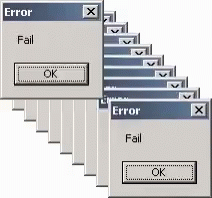The temporal journey of humanity has invariably intersected with the concepts of error and sin, each encapsulating complex dimensions of moral and ethical understanding. Within the Bahá’í faith, these terms hold profound significance, shaped by a perspective that encourages a paradigm shift in how individuals can perceive their actions and inherent nature. The distinctions between error and sin, while seemingly subtle, unveil a nuanced understanding of human behavior, spirituality, and personal growth.
At the outset, it is essential to delineate the definitions of error and sin from a Bahá’í perspective. Errors are understood as misunderstandings or mistakes that arise from the limitations of human knowledge and perception. They can occur in thought, action, or application of spiritual principles. In contrast, sin correlates with intentional wrongdoing—actions that explicitly contravene the commandments laid out in the sacred texts, often serving as barriers to one’s spiritual development.
This differentiation is pivotal, emphasizing that errors may stem from ignorance rather than malice. The Bahá’í teachings articulate that humanity is inherently noble, a potential reflecting divine attributes. As such, when individuals err, it is often because they are navigating through the complexities of life without full awareness or understanding. This perspective invites curiosity about the human condition and encourages individuals to adopt a more forgiving stance towards themselves and others.
The identification of error as a natural part of human experience fosters an atmosphere where inquiry and reflection are paramount. The Bahá’í scriptures advocate for a continual pursuit of knowledge, emphasizing that human comprehension is ever-evolving. As individuals confront their shortcomings, they are encouraged to view errors as opportunities for learning and growth rather than as irrevocable failures. This transformative approach can prompt a radical shift in self-perception and interpersonal relationships.
Equally essential is the necessity of recognizing the consequences that arise from sin—the intentional transgression that contravenes the laws of God. Sin, as articulated within Bahá’í literature, creates a state of disconnection from the divine source of life. Engaging in sinful behavior, therefore, does not only affect the individual’s relationship with the universe but also impacts communal harmony, underscoring the interconnectedness of humankind. The repercussions of sin often manifest as spiritual disquietude, societal discord, and emotional turmoil.
The juxtaposition of error and sin necessitates a nuanced understanding of divine justice. Bahá’í teachings assert that God’s justice is boundless and subsumes both mercy and accountability. Errors, being innate to the human experience, elicit compassion, while sins invoke a more serious contemplation as they imply a conscious detachment from truth and divine guidance. This dual framework encourages believers to navigate the delicate balance between understanding the origins of their actions and recognizing their moral responsibilities.
A pivotal aspect of this discourse revolves around repentance and accountability. In the Bahá’í context, repentance is not merely an act of remorse; it signals a commitment to rectifying past mistakes, whether arising from error or sin. This process involves self-examination and acknowledgment of one’s failings, coupled with the determination to align one’s conduct with divine principles in the future. Through sincere repentance, individuals can cultivate an intimate relationship with the Divine, facilitating their spiritual evolution.
The nature of sin also compels believers to consider the broader implications of communal ethics and collective responsibility. The Bahá’í faith posits that personal actions contribute to the full tapestry of human society. When individuals consciously choose to engage in sin, they disrupt the fabric of their communities—emphasizing the ripple effect of personal choices. This perspective engenders a sense of collective accountability and serves as a call to cultivate virtues such as integrity, honesty, and compassion in everyday interactions.
Furthermore, Bahá’í teachings invite adherents to appreciate the role of divine guidance in correcting errors and mitigating sinful behavior. The writings of Bahá’u’lláh—the founder of the Bahá’í Faith—serve as a compass for ethical conduct and spiritual development. By immersing themselves in the sacred texts, believers can glean insights and wisdom that illuminate their path, enabling them to transcend the pitfalls of error and to navigate the challenges presented by sin.
Amidst this exploration of error and sin, it becomes apparent that the Bahá’í perspective offers invaluable tools for fostering resilience and fostering transformation. Each error presents a chance for personal evolution; each instance of sin provides an opportunity for deep reflection and realignment with one’s spiritual aspirations. The clarity of purpose engendered by this understanding encourages individuals not only to strive for personal betterment but to extend compassion towards others who are likewise navigating their trials and tribulations.
In conclusion, the distinct yet interconnected nature of error and sin within the Bahá’í framework enriches our grasp of ethical and spiritual growth. By recognizing errors as a natural facet of the human experience while acknowledging the serious ramifications of sin, adherents are invited to cultivate a robust inner life of accountability, learning, and transformation. The journey toward understanding allows for a shift in perspective, encouraging a more compassionate and just approach to both individual and communal life, unearthing the promise of a more harmonious existence rooted in the principles of divine guidance.
